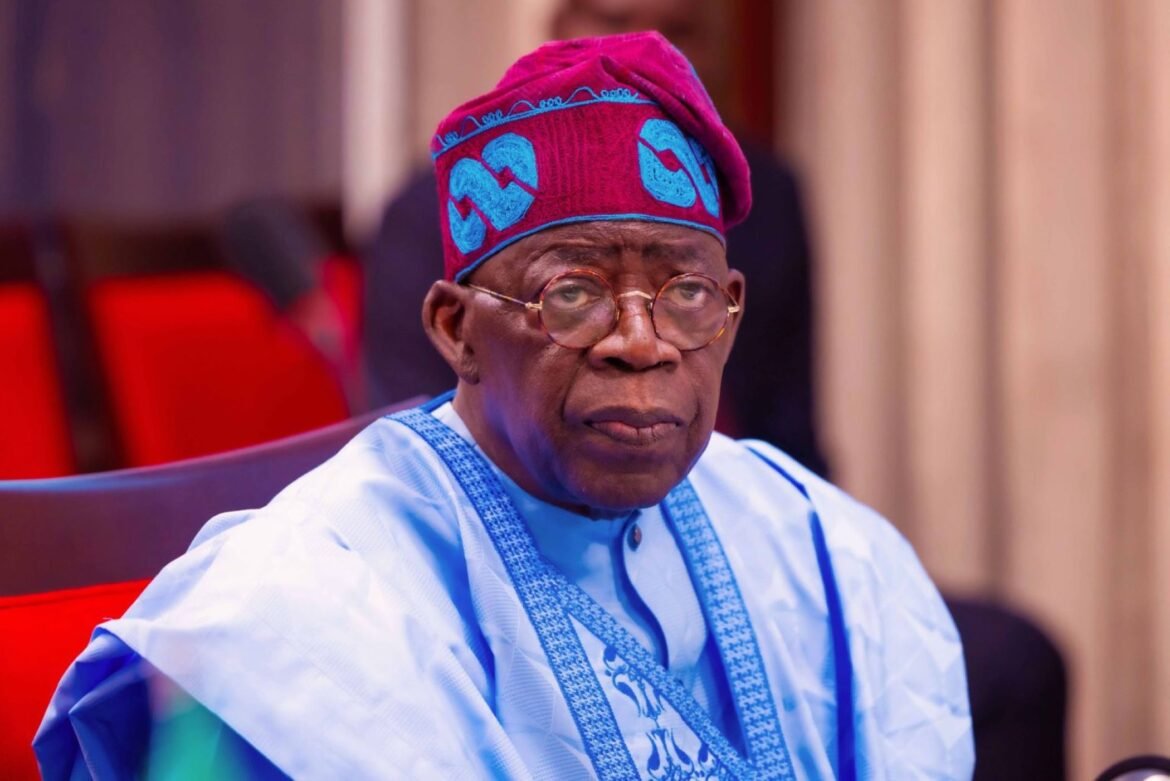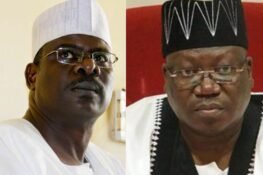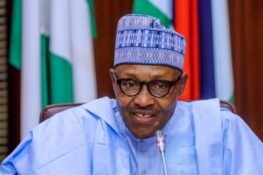There is tension across the nation. President Bola Tinubu feels and knows it.
Not that we haven’t experienced worrying insecurity before.
There is just an added pressure and focus from the rest of the world – since the US President, Donald Trump said he was coming with US troops to rescue Nigerian Christians from genocide by Islamic terrorists.
For the first time in his presidency, Tinubu cancelled a scheduled trip, an important one to the G20 Summit in South Africa.
His spokesman, Bayo Onanuga, wrote: “Disturbed by the security breaches in Kebbi State and Monday’s attack by bandits against worshippers at Christ Apostolic Church, Eruku, President Tinubu decided to suspend his departure.”
A service at the Christ Apostolic Church was interrupted by gunfire, forcing parishioners to take cover.
Armed men are seen entering and taking people’s belongings as gunshots continue.
The governor of Kwara State asked for the immediate deployment of security operatives following the church attack.
Around the same time, high school girls were abducted by armed men who stormed the Government Girls Comprehensive Secondary School in Kebbi State.
Vice President Kashim Shettima travelled to the state to meet officials and parents, mostly Muslims, demonstrating the seriousness of the situation.
In one case, the victims are Christians; in the other, the kidnapped are nearly all Muslims.
The claim that the insecurity issue in Nigeria is religious is therefore crushed.
President Trump is probably not able to pay attention to that fact.
How could he, when his busiest activity of the week was to host the butcher of Riyadh, the Saudi Crown Prince, Mohammed bin Salman Al Saud, who was given a lavish reception at the White House, attended by the cream of American society.
If the US was really serious about protecting Christians from harm around the world, it would start from Saudi Arabia, where citizens are not even allowed to listen to the Gospel.
Conversion of a Muslim to another religion is considered apostasy and punishable by death in Saudi Arabia.
The ridiculousness of the Trump administration’s stance on Nigeria aside, Nigeria has a problem which is damn serious and must be dealt with.
The Nigerian government has been fighting terrorism without success for 23 years.
In 2002, a cleric, Mohammed Yusuf, started Boko Haram in Borno State by tapping into deep-seated economic grievances to recruit disillusioned and impoverished Muslim youths from poor families who felt marginalized by Nigeria’s corrupt political establishment.
Yusuf wanted a “pure Islamic state” in Nigeria, a theocracy based on Sharia, viewing religious secularity as a corrupt Western system.
His message caught like wildfire among youths from extremely poor backgrounds.
Boko Haram and Nigerian security forces soon began to clash, causing hundreds of deaths, which eventually resulted in the extrajudicial killing of Mohammed Yusuf while in police custody.
The mishandling caused the group to become quickly radicalized under its next leader, Abubakar Shekau.
Since then, successive Nigerian administrations, instead of curtailing the spread, had only made the nation less safe.
At the root of our problem is corruption.
Corruption eats at anything along its way.
If the US was really serious about protecting Christians from harm around the world, it would start from Saudi Arabia, where citizens are not even allowed to listen to the Gospel
The Nigerian government officials, known for being fantastically corrupt kleptomaniacs, saw the fight against terrorism as an opportunity to get rich quickly.
The Goodluck Jonathan administration undermined the fight against Boko Haram through massive corruption and allegations of political maneuvering.
His ineptitude caused a significant weakening of security forces, contributing to the insurgency’s growth.
Boko Haram was after souls and it was allowed to gain it.
But it soon saw other possibilities.
It expanded its operations into illegal economic ventures, including unapproved mining, kidnapping, extortion, cattle rustling and armed robbery under the guise of Islam.
Instead of taking resolute actions, under Jonathan’s leadership, Nigeria experienced “Dasukigate,” in which an estimated $2.1 billion intended for the purchase of weapons to fight Boko Haram was diverted to fund Jonathan’s failed 2015 re-election campaign.
As Nigeria was imploding under the weight of corruption, crises in Libya, Egypt, Burkina Faso and other northern African countries allowed Boko Haram to be infiltrated by Islamic terrorist groups such as ISIS and Al Qaeda, with the aim of destabilizing Nigeria politically.
Things fell apart and the center failed to hold.
That was Jonathan.
His successor was a former general and a respected northerner who raised high hopes that he could tackle terrorism.
In fact, he campaigned on his ability to end terrorism and corruption. He stopped none.
Transparency International’s report in 2017 revealed that military officials under Buhari’s nose, had enrolled “ghost soldiers,” a ploy to pocket the pay checks of non-existent soldiers on the payroll.
It was more of the same -inflated contracts, purchase of substandard or outdated equipment, no-bid contracts, fund diversion from counterterrorism, and information leaks from the military leadership to terrorists.
The military was less capable to fight terrorism and banditry under Buhari.
Crimes spread to all parts of the country while Buhari focused on protecting his kinsmen – the Fulani herdsmen, who had become part of the criminal challenge, particularly in the Middle Belt.
Nigeria soon began to see high-profile financiers of terrorism around the corridors of power, while those bold enough to fight bandits ended up being detained in Abuja.
While Buhari had declared that he had “technically” won the war on terrorism in 2015, terrorists took the battle to his home state of Katsina and home city of Daura by the end of his time in power.
Buhari undermined his own fight against terrorism like Jonathan through ineptitude and corruption.
Then came the Tinubu administration, which has until recently seemed to have prioritized the economy over security.
From his first presidential speech, Tinubu gave the impression that prosperity is the solution to all problems.
Tinubu now faces the most serious security crisis of any Nigerian administration, with America breathing down on his neck.
To be fair, the late Chief of Army Staff, Lt. General Taoreed Lagbaja, demonstrated some no-nonsense seriousness about tackling terrorism.
But that sense of ambition and urgency was soon lost.
What Nigeria needs is a government that finally musters the political will to confront the cancer that has metastasized through its security apparatus: systemic corruption
Old accusations of corruption and wastage of military budget have continued under the Tinubu administration.
So, here’s the hard truth that Nigerian leaders need to hear: You cannot build a 21st-century economy on a foundation of 19th-century security failures.
You cannot attract the investment Nigeria desperately needs when schoolgirls are being kidnapped from their classrooms and worshippers are being terrorized in their churches and mosques.
You cannot preach “Renewed Hope” – Tinubu’s campaign slogan – when hope itself has become the rarest commodity in vast swaths of Nigerian territory.
What Nigeria needs now is not American troops or Trump’s theatrical gestures of concern.
What Nigeria needs is a government that finally musters the political will to confront the cancer that has metastasized through its security apparatus: systemic corruption.
Every naira stolen from the defense budget is a bullet not purchased, a soldier not trained, a community not protected.
Every general who treats counterterrorism funds as a personal pension plan is an accomplice to the bandits and terrorists who prey on Nigerian citizens.
And here’s what should terrify every Nigerian official: the world is watching now in ways it wasn’t before. Trump’s intervention – cynical and hypocritical as it may be – has turned a global spotlight on Nigeria’s inability to protect its own people.
That spotlight will not dim simply because Nigerian officials wish it away.
Foreign investors, international partners, and Nigeria’s own diaspora are all asking the same question: If the government cannot provide basic security, what can it provide?
The mathematics of failure are simple and brutal.
Twenty-three years of fighting Boko Haram.
Billions of dollars in security spending.
Thousands of lives lost. Millions displaced.
And yet the violence spreads like a virus with no vaccine, mutating from religious extremism into pure criminal enterprise, from one region to encompassing multiple states, from a nuisance to an existential threat.
At some point, you have to stop calling this a “challenge” and start calling it what it is: a catastrophic failure of governance.
President Tinubu has a choice to make, and he needs to make it now, not next month or next year.
He can continue the tradition of his predecessors – treating security as a political problem to be managed rather than a problem to be solved, allowing corruption to hollow out the military from within, prioritizing economics while the foundations of the state crumble.
Or he can break with that ruinous past and finally do what desperate times demand: conduct a complete purge of corruption in the security services, hold commanders accountable for every naira spent and every operation failed, empower honest officers who want to fight rather than steal, and most importantly, show Nigerians that their government values their lives more than the bank accounts of kleptocrats in uniform.
The first path leads to continued decay and possible state failure.
The second path is difficult, dangerous, and will make powerful enemies.
But it’s the only path that leads to a Nigeria where children can go to school without fear, where worshippers can pray in peace, and where the promise of Africa’s most populous nation can finally be realized.
The choice, Mr. President, is yours – but the clock is ticking, and your people are dying while you decide.








